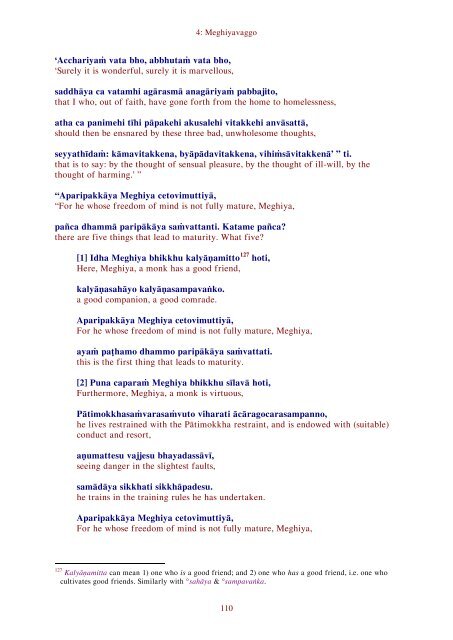Udāna, Exalted Utterances
A Pāli and English line by line (interlinear) version of this important collection of eighty discourses covering many themes and biographical details in the Buddha’s teaching (together with extensive annotation) (KN 3).
A Pāli and English line by line (interlinear) version of this important collection of eighty discourses covering many themes and biographical details in the Buddha’s teaching (together with extensive annotation) (KN 3).
Create successful ePaper yourself
Turn your PDF publications into a flip-book with our unique Google optimized e-Paper software.
4: Meghiyavaggo<br />
‘Acchariyaṁ vata bho, abbhutaṁ vata bho,<br />
‘Surely it is wonderful, surely it is marvellous,<br />
saddhāya ca vatamhi agārasmā anagāriyaṁ pabbajito,<br />
that I who, out of faith, have gone forth from the home to homelessness,<br />
atha ca panimehi tīhi pāpakehi akusalehi vitakkehi anvāsattā,<br />
should then be ensnared by these three bad, unwholesome thoughts,<br />
seyyathīdaṁ: kāmavitakkena, byāpādavitakkena, vihiṁsāvitakkenā’ ” ti.<br />
that is to say: by the thought of sensual pleasure, by the thought of ill-will, by the<br />
thought of harming.’ ”<br />
“Aparipakkāya Meghiya cetovimuttiyā,<br />
“For he whose freedom of mind is not fully mature, Meghiya,<br />
pañca dhammā paripākāya saṁvattanti. Katame pañca?<br />
there are five things that lead to maturity. What five?<br />
[1] Idha Meghiya bhikkhu kalyāṇamitto 127 hoti,<br />
Here, Meghiya, a monk has a good friend,<br />
kalyāṇasahāyo kalyāṇasampavaṅko.<br />
a good companion, a good comrade.<br />
Aparipakkāya Meghiya cetovimuttiyā,<br />
For he whose freedom of mind is not fully mature, Meghiya,<br />
ayaṁ paṭhamo dhammo paripākāya saṁvattati.<br />
this is the first thing that leads to maturity.<br />
[2] Puna caparaṁ Meghiya bhikkhu sīlavā hoti,<br />
Furthermore, Meghiya, a monk is virtuous,<br />
Pātimokkhasaṁvarasaṁvuto viharati ācāragocarasampanno,<br />
he lives restrained with the Pātimokkha restraint, and is endowed with (suitable)<br />
conduct and resort,<br />
aṇumattesu vajjesu bhayadassāvī,<br />
seeing danger in the slightest faults,<br />
samādāya sikkhati sikkhāpadesu.<br />
he trains in the training rules he has undertaken.<br />
Aparipakkāya Meghiya cetovimuttiyā,<br />
For he whose freedom of mind is not fully mature, Meghiya,<br />
127 Kalyāṇamitta can mean 1) one who is a good friend; and 2) one who has a good friend, i.e. one who<br />
cultivates good friends. Similarly with °sahāya & °sampavaṅka.<br />
110


















